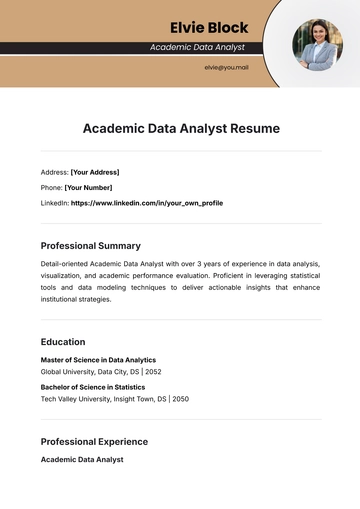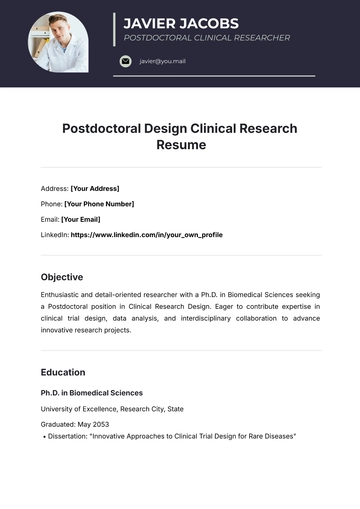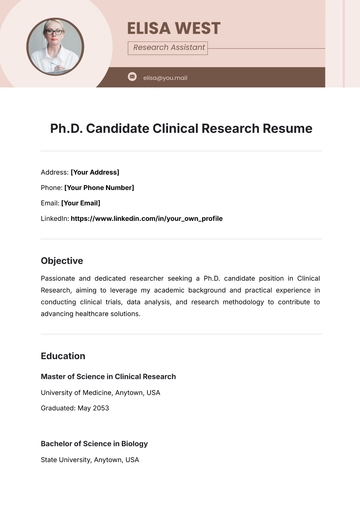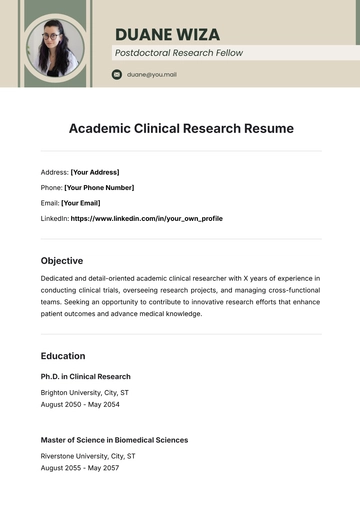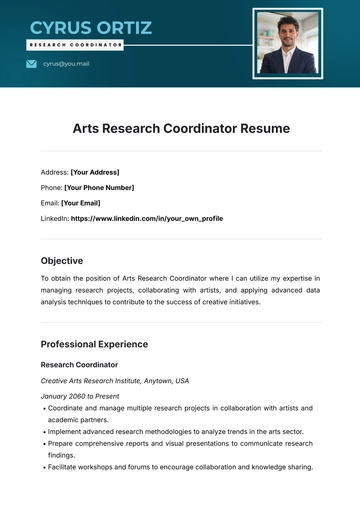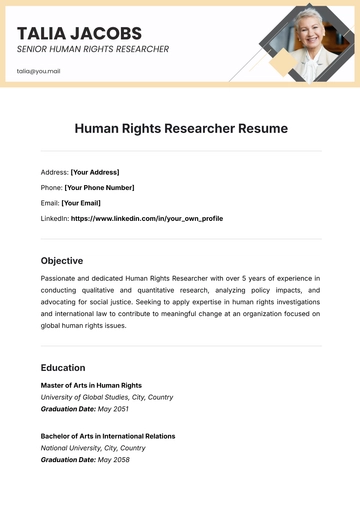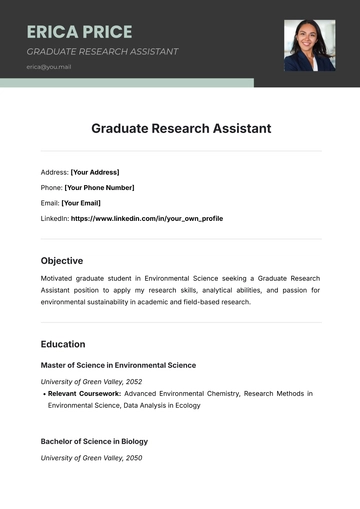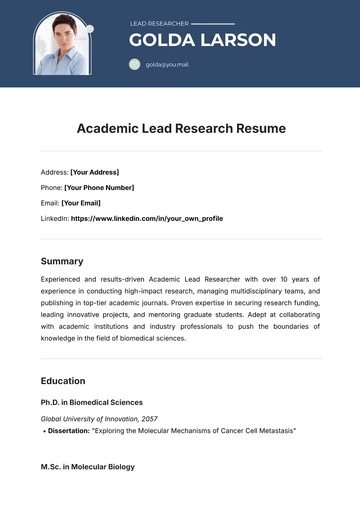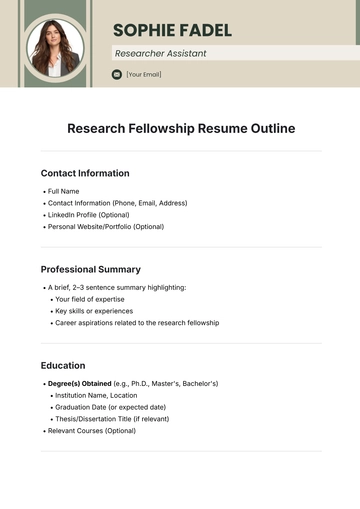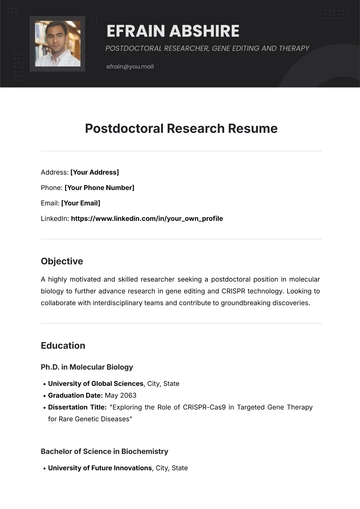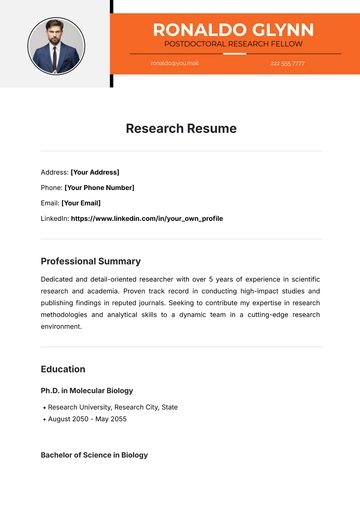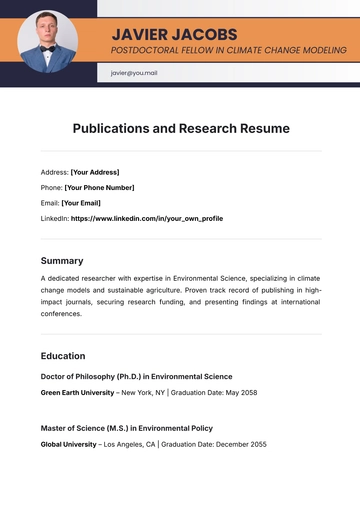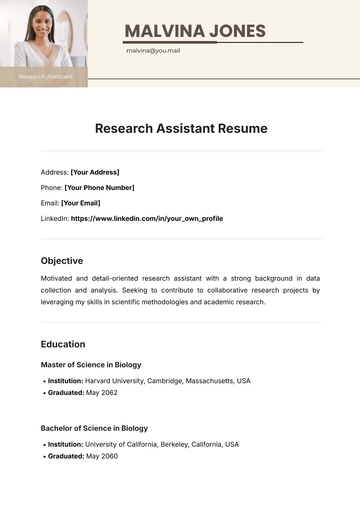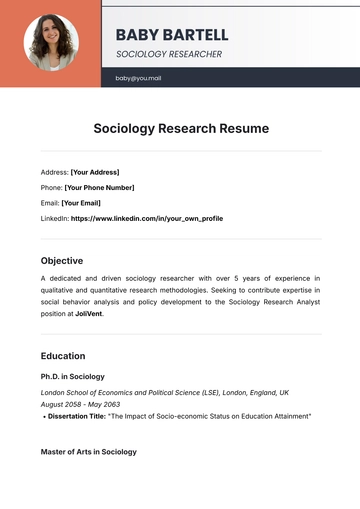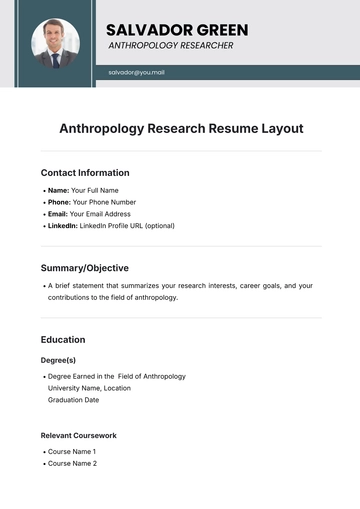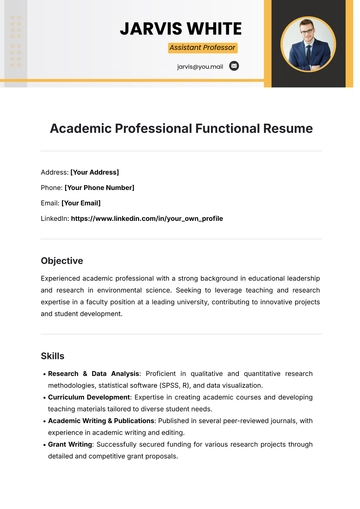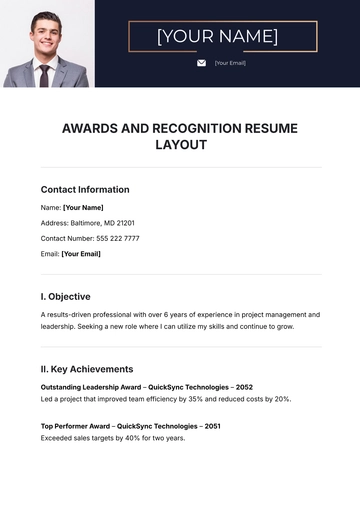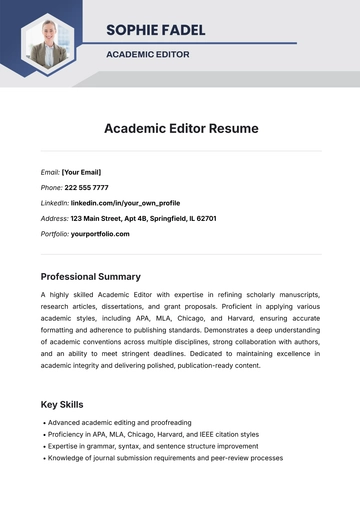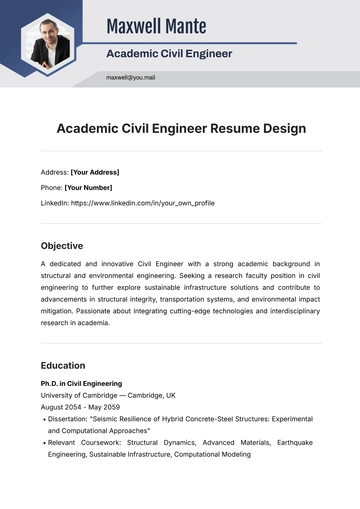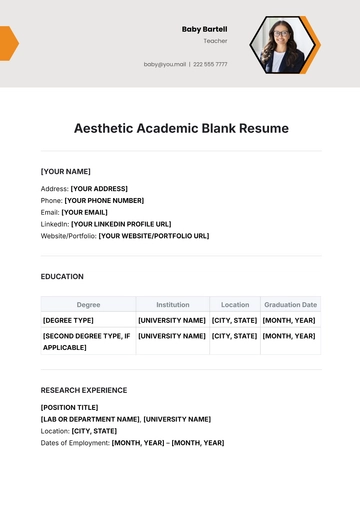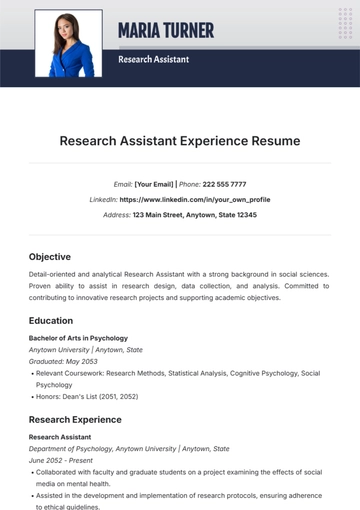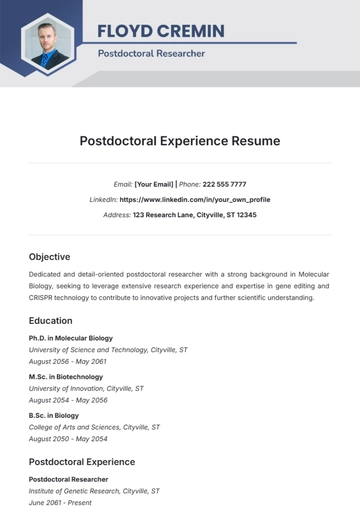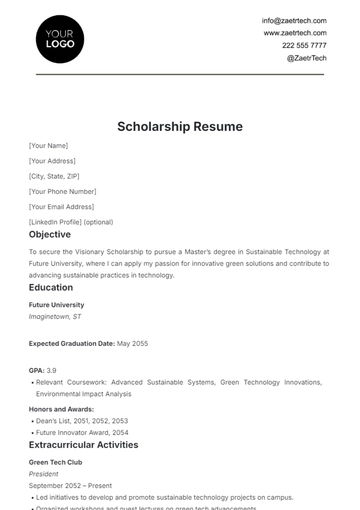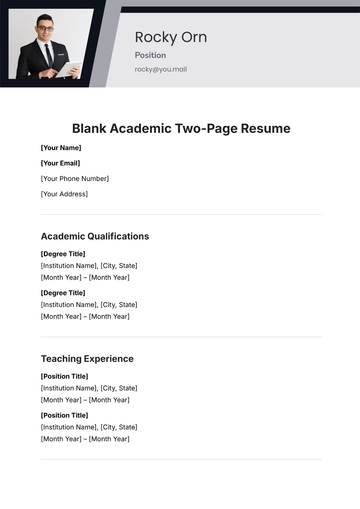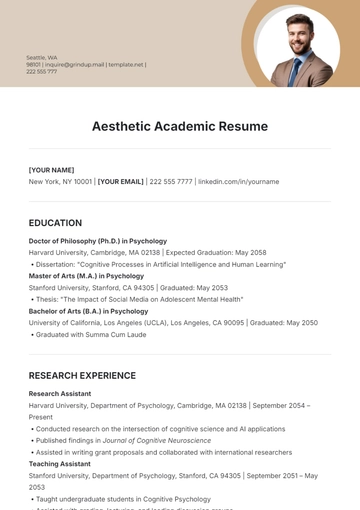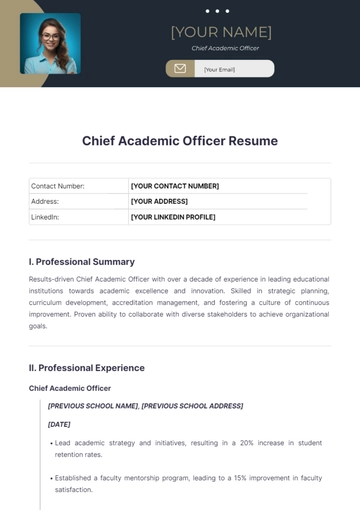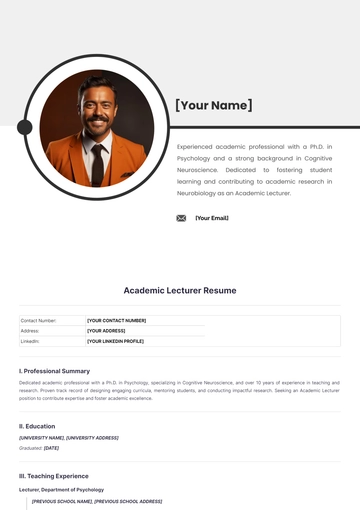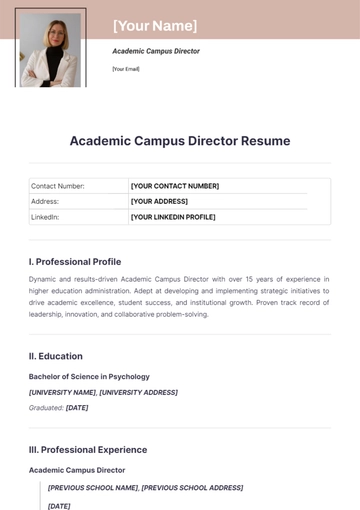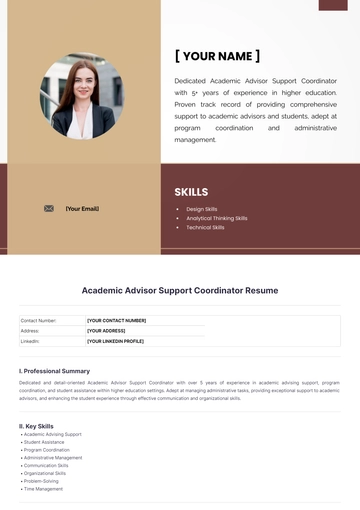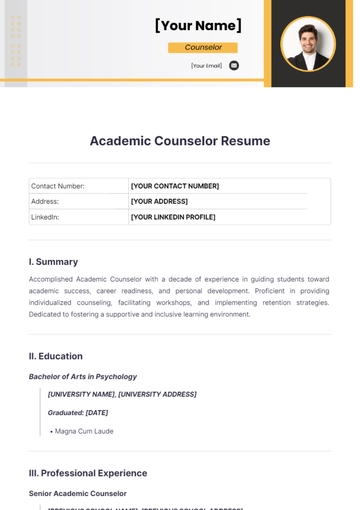Free Aesthetic Academic Resume
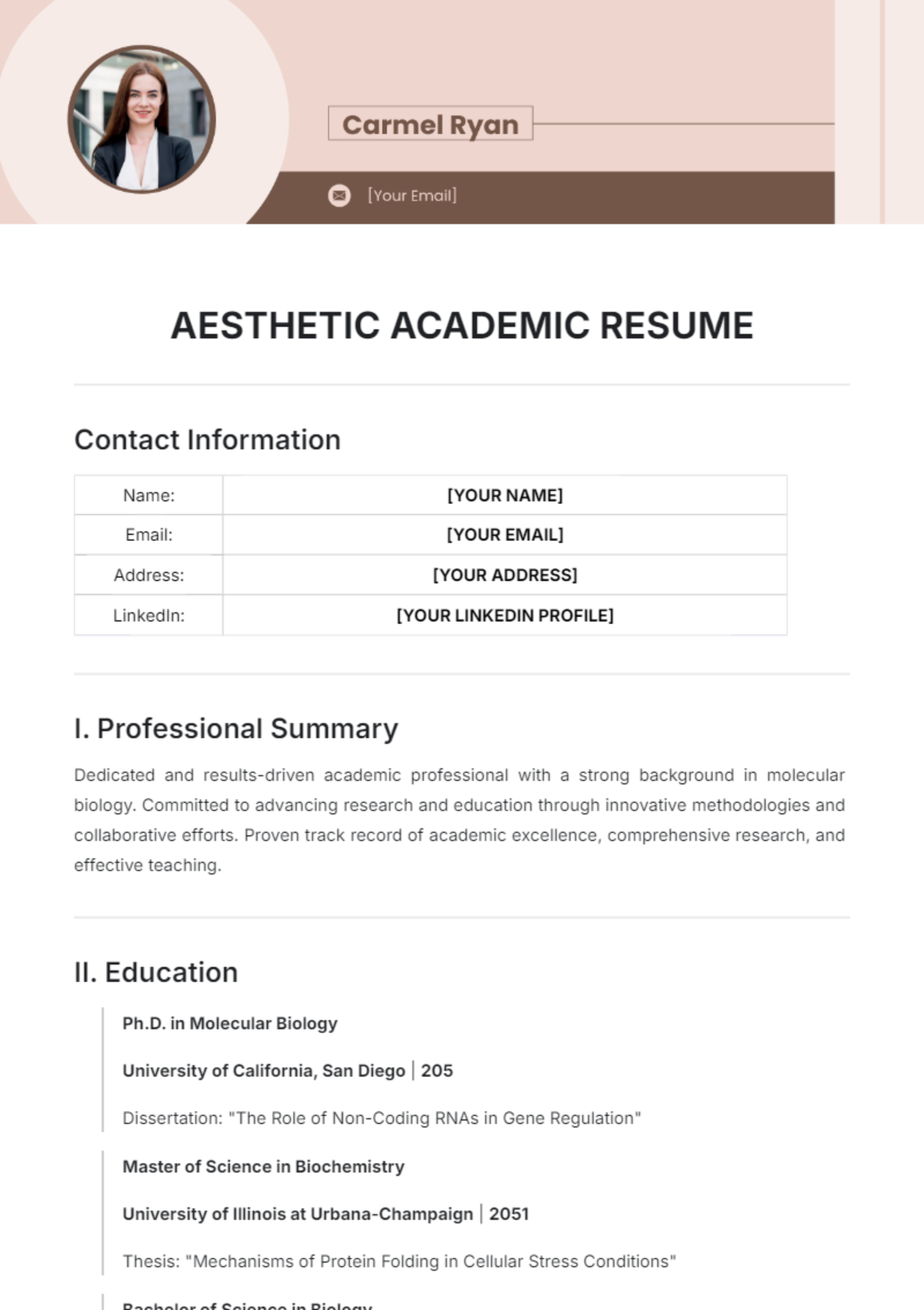
Contact Information
Name: | [YOUR NAME] |
Email: | [YOUR EMAIL] |
Address: | [YOUR ADDRESS] |
LinkedIn: | [YOUR LINKEDIN PROFILE] |
I. Professional Summary
Dedicated and results-driven academic professional with a strong background in molecular biology. Committed to advancing research and education through innovative methodologies and collaborative efforts. Proven track record of academic excellence, comprehensive research, and effective teaching.
II. Education
Ph.D. in Molecular Biology
University of California, San Diego | 205
Dissertation: "The Role of Non-Coding RNAs in Gene Regulation"
Master of Science in Biochemistry
University of Illinois at Urbana-Champaign | 2051
Thesis: "Mechanisms of Protein Folding in Cellular Stress Conditions"
Bachelor of Science in Biology
University of Washington | 2049
Graduated with Honors
III. Research Experience
Postdoctoral Researcher
Epigenetics Research Group | Harvard University, Cambridge, MA
January 2055 - Present
Conducted research on epigenetic modifications, resulting in 5 publications in peer-reviewed journals, including Nature Reviews Genetics and Cell Reports.
Collaborated with the Department of Genetics on interdisciplinary projects focused on gene expression and regulation.
Secured $150,000 in research funding through the National Institutes of Health (NIH) for a project examining the impact of non-coding RNAs on chromatin structure.
Presented research findings at international conferences, enhancing visibility and collaboration opportunities.
Graduate Research Assistant
Protein Dynamics Laboratory | Stanford University, Stanford, CA
September 2051 - December 2054
Assisted in research on protein homeostasis, leading to 3 conference presentations at the Society for Molecular Biology annual meetings.
Developed a novel bioinformatics tool to analyze protein interaction networks, streamlining research workflows and enhancing data analysis capabilities.
Published 4 articles in leading academic journals, including Nature and Science, contributing to the field's understanding of protein misfolding diseases.
Collaborated with interdisciplinary teams to explore the molecular basis of cellular stress responses.
IV. Teaching Experience
Assistant Professor
Department of Molecular Biology | Johns Hopkins University, Baltimore, MD
August 2055 - Present
Taught undergraduate and graduate courses in Molecular Biology and Genetics, with a focus on hands-on laboratory techniques and experimental design.
Supervised 8 graduate and 10 undergraduate students' theses and dissertations, fostering a collaborative research environment.
Developed curriculum and course materials for "Advanced Molecular Biology" and "Genomic Analysis," integrating current research trends and technologies.
Initiated a mentorship program for undergraduates interested in research careers, improving student engagement and retention.
Teaching Assistant
Department of Biochemistry | University of Illinois at Urbana-Champaign, Urbana, IL
September 2049 - May 2051
Conducted lectures, lab sessions, and office hours for "Biochemistry I" and "Cell Biology," emphasizing student participation and inquiry-based learning.
Graded assignments and exams for classes of up to 100 students, ensuring timely feedback and support for diverse learning styles.
Received the Teaching Excellence Award for outstanding contributions to the educational mission of the department.
Organized and led review sessions before exams, significantly improving student performance and understanding of complex topics.
V. Presentations
"Epigenetic Changes in Response to Environmental Stress", Presented at American Society for Cell Biology Annual Meeting.
"Innovative Techniques in Genomic Analysis", Presented at Genomics Conference.
"Advances in Protein Folding Research", Presented at Biochemistry Symposium.
VI. Grants and Funding
National Institutes of Health (NIH), $150,000, for "Epigenetic Modifications in Gene Expression".
National Science Foundation (NSF), $100,000, for "Protein Homeostasis in Stress Conditions".
American Cancer Society, $50,000, for "Non-Coding RNAs in Cancer".
VII. Awards and Honors
Teaching Excellence Award, awarded by Stanford University.
Best Dissertation Award, awarded by Harvard University.
Young Investigator Award, awarded by American Society for Cell Biology.
VIII. Professional Memberships
Member, American Society for Cell Biology.
Member, Genetics Society of America.
Member, American Association for the Advancement of Science.
X. Skills
Technical Skills
Proficient in CRISPR-Cas9 technology
Experienced in Next-Generation Sequencing (NGS)
Skilled in Fluorescence Microscopy
Interpersonal Skills
Excellent written and verbal communication
Strong collaborative and teamwork abilities
Effective mentoring and leadership
- 100% Customizable, free editor
- Access 1 Million+ Templates, photo’s & graphics
- Download or share as a template
- Click and replace photos, graphics, text, backgrounds
- Resize, crop, AI write & more
- Access advanced editor
Introducing the Academic Resume Template, meticulously crafted by Template.net to help scholars, researchers, and educators showcase their academic achievements, skills, and experience effectively. This customizable document empowers candidates to highlight their education, degrees, certifications, research experience, publications, teaching experience, grants, and any notable academic achievements. With editable features and a clean, user-friendly layout, it facilitates the creation of a standout resume tailored to academic job applications. Make a strong impression on potential employers or academic institutions and advance your career with the Academic Resume Template, your essential tool for demonstrating your scholarly expertise and academic accomplishments.
You may also like
- Simple Resume
- High School Resume
- Actor Resume
- Accountant Resume
- Academic Resume
- Corporate Resume
- Infographic Resume
- Sale Resume
- Business Analyst Resume
- Skills Based Resume
- Professional Resume
- ATS Resume
- Summary Resume
- Customer Service Resume
- Software Engineer Resume
- Data Analyst Resume
- Functional Resume
- Project Manager Resume
- Nurse Resume
- Federal Resume
- Server Resume
- Administrative Assistant Resume
- Sales Associate Resume
- CNA Resume
- Bartender Resume
- Graduate Resume
- Engineer Resume
- Data Science Resume
- Warehouse Resume
- Volunteer Resume
- No Experience Resume
- Chronological Resume
- Marketing Resume
- Executive Resume
- Truck Driver Resume
- Cashier Resume
- Resume Format
- Two Page Resume
- Basic Resume
- Manager Resume
- Supervisor Resume
- Director Resume
- Blank Resume
- One Page Resume
- Developer Resume
- Caregiver Resume
- Personal Resume
- Consultant Resume
- Administrator Resume
- Officer Resume
- Medical Resume
- Job Resume
- Technician Resume
- Clerk Resume
- Driver Resume
- Data Entry Resume
- Freelancer Resume
- Operator Resume
- Printable Resume
- Worker Resume
- Student Resume
- Doctor Resume
- Merchandiser Resume
- Architecture Resume
- Photographer Resume
- Chef Resume
- Lawyer Resume
- Secretary Resume
- Customer Support Resume
- Computer Operator Resume
- Programmer Resume
- Pharmacist Resume
- Electrician Resume
- Librarian Resume
- Computer Resume
- IT Resume
- Experience Resume
- Instructor Resume
- Fashion Designer Resume
- Mechanic Resume
- Attendant Resume
- Principal Resume
- Professor Resume
- Safety Resume
- Waitress Resume
- MBA Resume
- Security Guard Resume
- Editor Resume
- Tester Resume
- Auditor Resume
- Writer Resume
- Trainer Resume
- Advertising Resume
- Harvard Resume
- Receptionist Resume
- Buyer Resume
- Physician Resume
- Scientist Resume
- 2 Page Resume
- Therapist Resume
- CEO resume
- General Manager Resume
- Attorney Resume
- Project Coordinator Resume
- Bus Driver Resume
- Cook Resume
- Artist Resume
- Pastor Resume
- Recruiter Resume
- Team Leader Resume
- Apprentice Resume
- Police Resume
- Military Resume
- Personal Trainer Resume
- Contractor Resume
- Dietician Resume
- First Job Resume
- HVAC Resume
- Psychologist Resume
- Public Relations Resume
- Support Specialist Resume
- Computer Technician Resume
- Drafter Resume
- Foreman Resume
- Underwriter Resume
- Photo Resume
- Teacher Resume
- Modern Resume
- Fresher Resume
- Creative Resume
- Internship Resume
- Graphic Designer Resume
- College Resume
